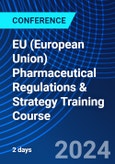Creating and coordinating an effective regulatory strategy is an essential part of the work of a regulatory affairs department and can save valuable time and money.
This interactive course will provide an overview of the European pharmaceutical regulatory environment, procedures and obligations and discuss how to interpret and apply the legislation.
The programme will cover the legal basis of regulation, development strategies and the importance of pre-submission activities as well as an overview of the format for presentation of data, the registration procedures for obtaining marketing authorisations and post-authorisation obligations and strategic considerations. The impact of post-Brexit changes for obtaining and maintaining marketing authorisations in the UK will be considered.
There will be a number of case study sessions throughout the two days to explore options and strategies for these key regulatory activities, which will provide an opportunity for discussion and the sharing of experiences with our expert trainer and other delegates.
Benefits of attending
- Understand the legal basis of the EU regulatory environment
- Discuss development strategy and pre-submission activities
- Review procedures for applying for a marketing authorisation in the EU/EEA and in the UK
- Discuss post-authorisation strategic considerations and obligations
- Explore the impact of post-Brexit changes
- Discuss the proposed EU pharmaceutical legislation changes
Certification:
- CPD: 12 hours for your records
- Certificate of completion
Agenda
DAY 1
EU regulatory environment: legal basis
- Key regulations, directives and guidelines
- Impact of Brexit
- Proposed EU pharmaceuticals legislation (specific changes will be discussed in the relevant section of the programme)
Information sources
Case Study One
Development and Strategy
- Drug discovery
- Scientific advice
Development process
- Pharmaceutical R&D
- Non-clinical tests
- Clinical studies - Phase I to III
EU Clinical Trials Regulation
Types and categories of marketing Authorisations
Adaptive marketing authorisation procedures
The Common Technical Document (CTD)
- Overview of Structure and content of a CTD
Procedures for obtaining a marketing authorisation in the EU with discussion on the impact of Brexit and the proposed EU legislation changes
- The EMA
- The EU centralised procedure
Other EU centralised procedures
- Referral and arbitration
DAY 2
Other procedures for obtaining a marketing authorisation in the EU
- Coordination group
- Decentralised procedure
- Mutual recognition procedure
- National procedures
Managing product labelling
Case Study Two
Abridged applications and Generics
- Types and Requirements
Product Life Cycle; Post approval
Patents and SPCs
Parallel trade
- How the process works
- Impact of Brexit
Post-authorisation obligations; pharmacovigilance, variations and renewals
Pharmacovigilance including discussion on the impact of Brexit
Licence variations
- Type I and Type II variations and timelines
- Procedures and timelines
Extensions
Case Study Three
Renewals
Sunset clause
Phase IV Trials
Classification change
Generic development
Strategic factors
Criteria for successful products
Speakers

Ms Norah Lightowler,
Lightowler AssociatesNorah Lightowler is a partner in Lightowler Associates, an independent consultancy offering regulatory advice and support to pharmaceutical companies in or proposing to enter the European market for human pharmaceuticals. They are in their twentieth year of successful business. Norah has wide experience in the pharmaceutical and related neutraceutical, herbal and devices industries as a pharmaceutical assessor with the UK regulatory authority and as associate director of European regulatory affairs with an international pharmaceutical company. She is experienced in organising and presenting courses on European regulatory control systems, including requirements, procedures and strategy.
Who Should Attend
The course is designed primarily for regulatory affairs personnel, however it will also be of value to those who interact with the regulatory affairs function and would benefit from an understanding of action timelines and information requirements. It will be particularly relevant to all those working in:
- Regulatory affairs
- Project management
- Business planning
- Commercial management
- Manufacturing and QA
- Labelling and artwork
- Medical information
- Clinical
- Pharmacovigilance









